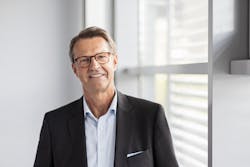Lenze Celebrates its 75th Anniversary and Double-digit Growth
In the financial year 2021/2022 (01.05.2021 – 30.04.2022), Lenze SE says it successfully positioned itself in the market with new developments and collaborations, and in its 75th anniversary achieved record results. The Group’s revenue in the previous financial year grew by 21% to 832.6M euros. The automation specialist’s volume of orders grew by 50% to more than 1.1B euros. The operating result came to 91.8M euros and was also well over the previous year’s result (47.1M euros). The EBIT margin likewise improved, from 6.8% in the previous year to 11%. The company explains that the divestment of the Mobile Drives division by Lenze Swiss AG contributed to the positive operating result.
Automation will remain a winning sector
“Even in a turbulent market environment, automation will remain a winning sector in the coming years,” said Lenze CEO Christian Wendler. He sees the sector and the company staying on track for growth, despite continuing challenges through COVID-19 and downstream supply-chain problems. “Industry must quickly boost its reduction of CO2 emissions. We are helping our customers to develop sustainable, energy-efficient production processes–with automation and digitization. In particular, because of increasing cost pressures and ever stricter environmental regulations, we are providing our partners in the small and medium-sized business sector with value-adding solutions, helped by smart data: using our many years of expertise and our domain knowledge, we analyze and interpret their machine data and gain relevant insights for our customers. In this way we can precisely map out a machine’s energy needs and reduce energy consumption on average by up to 30%. Automation is the key to sustained success.”
The markets in the USA and China are developing in a similar direction. “In addition to the growing pressure on industry worldwide with regards to emissions obligations, one of the biggest challenges for Lenze’s customers is the shortage of skilled personnel,” said Wendler. “The shortage of trained personnel is a push-factor for automation projects, for example in the field of intralogistics. This is why companies all over the world are automating their storage and material-flow processes–and not only in commerce. The intralogistics sector is a dynamic and strategically important field for Lenze.”
Lenze also aims to support machine and plant manufacturers in their search for new, digital business models, and relies on a triad consisting of electrical engineering, software, and a platform strategy, according to the company. “Today it is no longer enough just to sell hardware. Together with our customers, we must work more closely with the operators to be able to reach a better understanding of processes and needs, and to develop business models based on that. Many smaller machine manufacturers cannot develop digital services themselves. Lenze helps them with the development and the implementation,” explained Wendler.
Strategic investment in new forms of collaboration
To achieve this goal of developing business models and solutions in collaboration, Lenze is intensifying its cooperation with start-ups, suppliers, scientific institutes, and customers. “We have to work together more closely and more agilely,” explained Wendler. In the 2021/2022 financial year, Lenze created forward-looking places for collaboration. One example is the Mechatronic Competence Campus (MCC) at the company’s Extertal site. “The MCC opens officially on 15 October 2022 and will be the heart of Lenze mechatronics. The aim is to bring all our expertise together in one place so as to speed up our development of drive solutions consisting of mechanics, electronics and software, which our customers need in order to succeed against the competition,” said Wendler.
The Digital Hub Industry in Bremen has also been facilitating innovative forms of collaboration since summer 2022. Working there in close cooperation with the University of Bremen, Lenze offers small and medium-sized businesses an ecosystem for the open exchange of experiences and ideas and for experiments and collaborations. It is only in collaboration that beneficial digital services and business models can be created, according to Lenze. “We believe that this requires courage and the readiness to change. It is no coincidence that ‘The Courage of Change’ is Lenze’s jubilee motto in 2022,” said Wendler.


